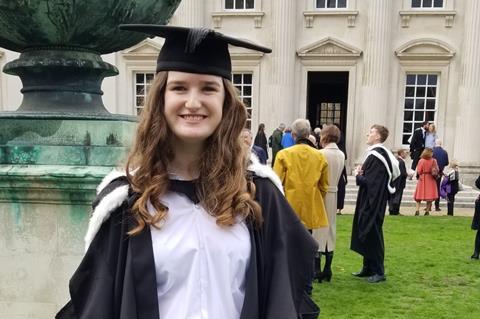A devastating diagnosis caused Emma Hide to question everything she believed in. But God was able to restore her foundations and now her faith is stronger than ever

Sometimes you don’t know how much you depend on something until it’s gone. For me, this sentiment never rang more true than when I suddenly lost my health four years ago.
For as long as I can remember, I was hard-working, ambitious, super sporty and sociable. I’d been studious at school and somehow managed to get into University of Cambridge. My ambitions for the future were big.
Then, during my second year at university, everything changed overnight. I literally woke up one morning and my capacity to do anything had been drastically reduced. Following months of flu-like exhaustion, widespread pain, aching and utter despair and confusion, I received a devastating diagnosis: chronic fatigue – or fibromyalgia.
Losing myself
Losing my physical health showed me how much I’d previously taken it for granted. I was unable to participate in activities I once enjoyed, such as running, sport or even walking. Everyday tasks became a struggle. I was unable to go out and became very isolated and low. I realised what a privilege it was to be able to do these everyday things.
As Christians we’re vulnerable to pinning our sense of self-worth on our own good works
Perhaps even more devastating was the loss of my sense of identity and worth. It was only when my health was taken away from me that I realised how my sense of self was utterly dependent on my ability to ‘do’. Without this I felt worthless. I began to dread a future devoid of purpose and accomplishment.
As a Christian, I’d been repeatedly told that salvation, worth and God’s love are not earned through works. Instead our identity is rooted in our status as God’s beloved children. While these truths are fundamental, and completely life-transforming when fully embraced, I realised that my belief in them had only been surface-level. They had not yet permeated my heart as genuine and deeply held convictions.
Instead of finding security in my God-given identity, my inability to produce an abundance of visible, material outputs led me to feel useless, unproductive and unworthy of the title “child of God”. I looked around at my friends and saw enviable job offers, first-class degrees, incredible acts of service, exciting moves to the big city and vibrant social lives. My life felt like a complete failure in comparison. My dependence on ‘doing’ and ‘achieving’ to validate my sense of self and worth was brutally exposed. The realisation was painful but, ultimately, transformative.
Rebuilding the ruins
I’m now eternally grateful to God for highlighting this lesson to me and guiding me through it. In a society obsessed with material success, status and self-image, we’re all vulnerable to believing that our worth is tied to things such as how hard we work, how much we earn, or how many friends we have, real or virtual. As Christians we’re also vulnerable to pinning our sense of self-worth on our own good works: how many people we help, how many teams we serve in, or how many people we lead to Christ.
While these things aren’t bad, they’re not a secure foundation on which to build our sense of identity. When it is, our self-worth can become shattered by life’s unpredictable challenges, including job losses, financial hits, physical and mental health crises, or the unexpected loss of people we care about.
In contrast, anyone who builds their sense of worth on the truth of who we are in God is like the wise man in Luke 6, who builds his house on the rock. The storms will come but the house won’t fall because it’s built on something truly unshakable.
Losing my physical health showed me how much I’d previously taken it for granted
When we truly grasp that God’s immense love for us is not dependent on what we do for him, we become unshakable. Embracing our identity as beloved and precious children of God provides a solid foundation to withstand the storms of life. When God’s unconditional love for us becomes the bedrock of our identity, we can remain firm in who we are, even if our life appears to be tumbling down.
As God has gradually (and painfully) shifted me away from previous markers of identity and worth towards the unshakable rock of my godly identity, I’ve begun to experience freedom in my life. I no longer feel useless, insignificant or unproductive. Instead, I’ve begun to feel deeply loved, chosen and tailor-made by God.
This transformation has had a profound impact on my emotional and physical well-being. As my health has gradually improved, I’ve not fallen back into the trap of seeking worth through constant productivity.
I no longer feel hopeless about the future. While my health is still not optimal, I have genuine hope that my future will be full of life because, whatever happens, I have a God who loves me personally and is able to work all things for good. These are things I can always depend on, and so can you.






































No comments yet